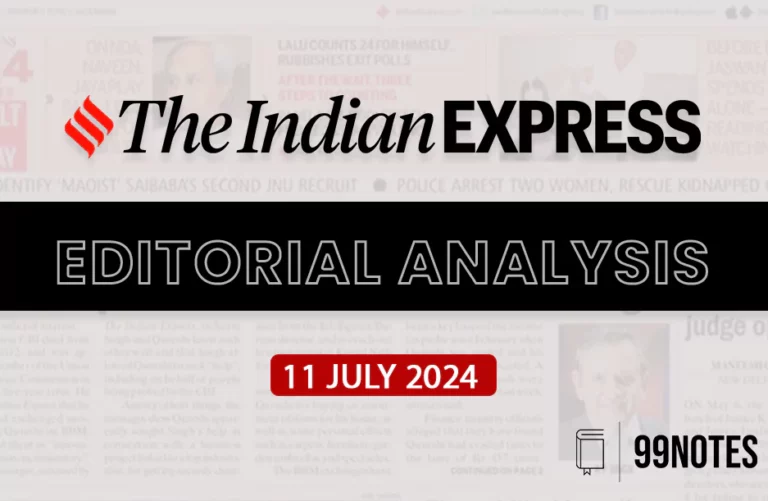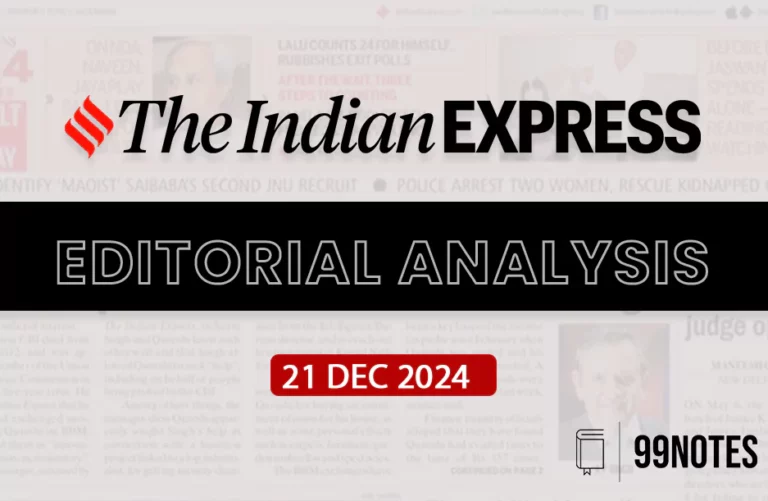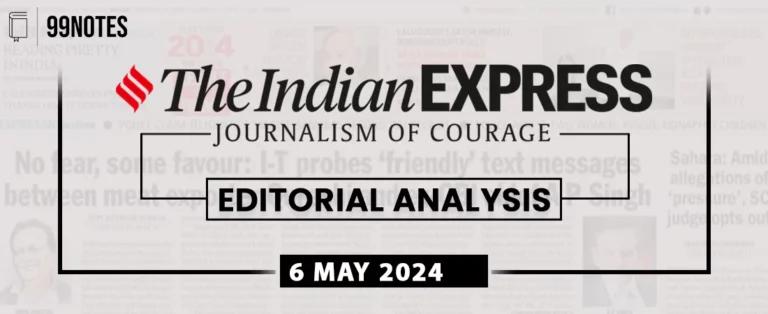9 April 2024 : Indian Express Editorial Analysis
Indian Express Editorial Analysis
10-April-2024
1. Laws for a better climate
|
Topic: GS2 – Governance – Government policies – Interventions for development in various sectors GS3 – Environment This topic is relevant for both Prelims and Mains as the analysis delves into the legal framework concerning environmental protection and climate change in India. |
| Context: |
|
The Lack of Legislative Framework:
- The absence of a comprehensive legislative framework addressing climate change raises questions about the Indian Constitution’s recognition of the environment’s significance.
- Despite various policies and governmental decisions concerning environmental concerns, there’s a noticeable absence of explicit constitutional provisions addressing climate change.
- This absence is highlighted by the lack of decentralized legislative measures aimed at addressing environmental issues at different administrative levels.
Historical Perspective: Colonial Influence:
- The colonial legacy has significantly shaped India’s legal framework concerning environmental protection.
- There is a colonial perspective on environmental resources, primarily viewing them as assets for human exploitation.
- This anthropocentric view persisted in the drafting of the Constitution, which lacked a holistic understanding of the environment beyond its constituent parts like water, air, and soil.
Constitutional Provisions and Legislative Authority:
- The Indian Constitution grants Parliament the residual power to legislate on matters not explicitly listed in legislative lists.
- However, the understanding of environmental protection within the Constitution is limited, with the Environmental Protection Act of 1986 being passed under Article 253 to implement international agreements.
- This act grants sweeping powers to the central government to protect and improve the environment but lacks a comprehensive approach to environmental governance.
Fragmented Legislative Power:
- The Constitution’s fragmented understanding of the environment is reflected in the division of legislative power among different entries dealing with specific components like water, air, and forests.
- However, there’s a notable absence of a centralized source of legislative authority aimed at protecting the environment or mitigating the impacts of climate change.
Proposed Changes and Decentralization:
- To address the deficiencies in the current constitutional position regarding the environment, there is a growing call for introducing “environment” as an entry in the Concurrent List.
- This move towards decentralization aligns with the principles of cooperative federalism, allowing both the central and state governments to legislate on environmental matters.
- Such a decentralized approach acknowledges the varying vulnerabilities of different states to environmental emergencies and emphasizes local decision-making to reduce damage.
Challenges and Future Directions:
- Despite efforts by states to prioritize climate policy and develop climate action plans, implementation has been hindered by a lack of financial support from the central government.
- This centralization of financial decisions, despite states being better equipped to respond to environmental emergencies, underscores a significant gap in the current federal structure.
- Reimagining Indian federalism to prioritize subsidiarity, or decision-making at the lowest practical level, is crucial to effectively address the potentially catastrophic effects of climate change on society.
Conclusion:
- The Supreme Court’s recognition of the absence of a singular legislation on climate change underscores the need for a comprehensive overhaul of India’s environmental governance framework.
- Reimagining federalism to prioritize decentralization and subsidiarity is essential to empower states in addressing environmental challenges and mitigating the impacts of climate change effectively.
| Measures Taken to Protect Human Rights Against Climate Change |
|
On National Level:
|
| PYQ: The most significant achievement of modern law in India is the constitutionalization of environmental problems by the Supreme Court. Discuss this statement with the help of relevant case laws. (UPSC CSE (M) GS-2 2022) |
| Practice Question: Discuss the implications of the Supreme Court’s ruling recognizing the absence of a singular legislation addressing climate change in India. (150 words/1 m) |
2. The troubled campus
|
Topic: GS2 – Social Justice – This topic is relevant for both Prelims and Mains as the analysis highlights the societal pressures and cultural norms that contribute to the mental health challenges faced by students in premier institutes. |
| Context: |
|
Addressing Symptoms, Not Causes:
- While institutions have implemented various support mechanisms, such as student volunteers, counselors, and academic extensions, these efforts often target symptoms rather than root causes.
- The analogy of addressing heart disease illustrates the importance of identifying underlying factors contributing to student distress, beyond merely mitigating immediate consequences.
Cultural and Academic Pressures in Premier Institutes:
- Premier institutes like IITs are primarily associated with job prospects rather than educational excellence, perpetuating a culture of intense competition among students.
- The emphasis on astronomical starting salaries overshadows the value of holistic education, contributing to unrealistic expectations and heightened competition for admissions.
Impact of Competitive Environment:
- The hyper-competitive environment in coaching centers and the relentless pursuit of academic success from a young age isolate students from crucial aspects of family and social life.
- The narrow focus on exam performance as the sole measure of worth deprives students of diverse experiences and holistic development, exacerbating feelings of inadequacy and stress.
Realistic Expectations and Career Prospects:
- The discrepancy between aspirational expectations and realistic career outcomes leads to disillusionment among undergraduate and postgraduate students.
- Despite rigorous academic training, students often face challenges in adapting to the demands of their courses and securing satisfactory placements, contributing to overall dissatisfaction within premier institutes.
Proposed Solutions and Reforms:
- To address the underlying causes of student unhappiness, systemic reforms are imperative.
- This includes fostering realistic expectations among students and parents, engaging with the media to portray accurate career prospects, and reorienting institutional priorities towards holistic education rather than placement statistics.
- Measures such as smaller classrooms, accessible mentorship, and diversified extracurricular activities can contribute to a more supportive and conducive learning environment.
Conclusion:
- The prevailing unhappiness within premier institutes underscores the need for fundamental changes in academic culture and institutional practices.
- By promoting realistic expectations, prioritizing holistic education, and enhancing student support services, premier institutes can fulfill their role as centers of learning and innovation, fostering student well-being and academic excellence.
| What are the Initiatives to Curb Suicides? |
|
Global Initiatives:
|
| PYQ: Explain why suicide among young women is increasing in Indian society. (150 words/10m) (UPSC CSE (M) GS-1 2023) |
| Practice Question: Discuss the challenges faced by students in premier institutes and propose practical solutions to address their mental health and well-being, emphasizing the role of institutions and society. (250 words/15 m) |
For Enquiry

10 April 2024 : Indian Express Editorial Analysis

9 April 2024 : Daily Current Affairs Quiz

9 April 2024 : Daily Answer Writing

9 April 2024 : Daily Current Affairs

9 April 2024 : PIB Summary for UPSC

9 April 2024 : The Hindu Editorial Notes PDF

9 April 2024 : Indian Express Editorial Analysis

8 April 2024 : Daily Current Affairs Quiz

8 April 2024 : Daily Answer Writing

8 April 2024 : Daily Current Affairs
April 2024 Indian Express 10 April 2024 : Indian Express Editorial Analysis Indian Express Editorial Analysis
9-April-2024
1. Quality of growth
Topic: GS3 – Indian economy…
Daily Quiz 9 April 2024 : Daily Current Affairs Quiz 9- April 2024 : Daily Quiz…
mains answer writing 9 April 2024 : Daily Answer Writing Mains Answer Writing
9-April-2024
Q1) Shared values, histories, and interests of the members enable…
April 2024 Daily Current Affairs 9 April 2024 : Daily Current Affairs Daily Current Affairs
9-April -2024- Top News of the Day
1. Supreme Court Urges Centre and States to…
April 2024 PIB 9 April 2024 : PIB Summary for UPSC PIB Summary for UPSC
9-April-2024
1. PRESIDENT’S GREETINGS ON THE EVE OF CHAITRA SUKLADI, UGADI, GUDI…
April 2024 The Hindu Editorial 9 April 2024 : The Hindu Editorial Notes PDF The Hindu EDITORIAL
9-April-2024
1. Indian aviation, a case of air safety at a discount.
Topic:…
April 2024 Indian Express 9 April 2024 : Indian Express Editorial Analysis Indian Express Editorial Analysis
9-April-2024
1. Quality of growth
Topic: GS3 – Indian economy…
Daily Quiz 8 April 2024 : Daily Current Affairs Quiz 8- April 2024 : Daily Quiz…
mains answer writing 8 April 2024 : Daily Answer Writing Mains Answer Writing
8-April-2024
Q1) The failures of the United Nations (UN) in addressing crucial…
April 2024 Daily Current Affairs 8 April 2024 : Daily Current Affairs Daily Current Affairs
8-April -2024- Top News of the Day
1. Traders rue underpriced onion exports to…




